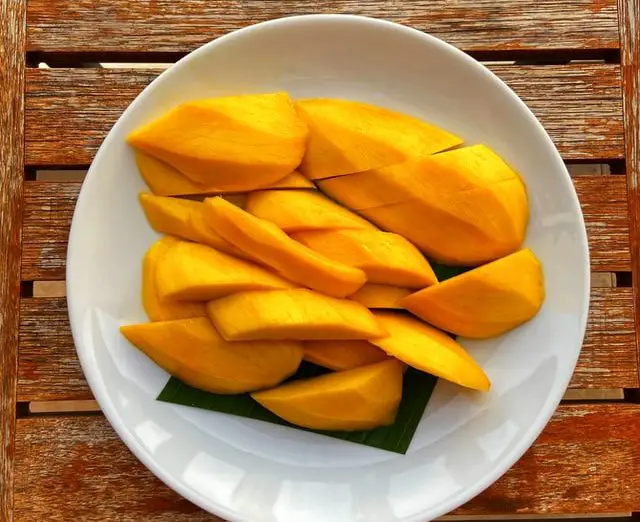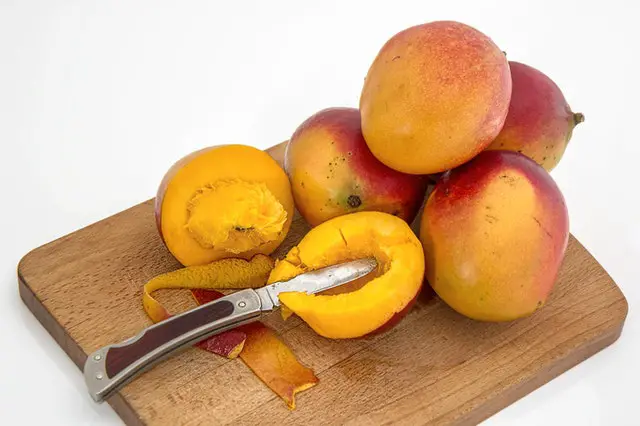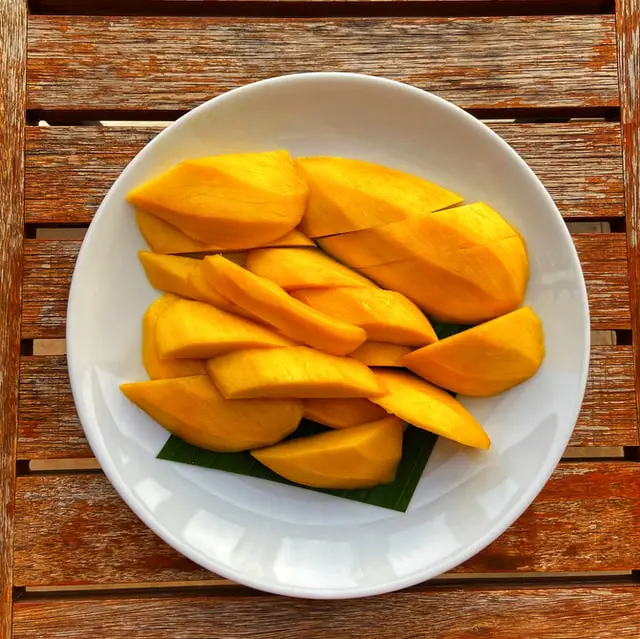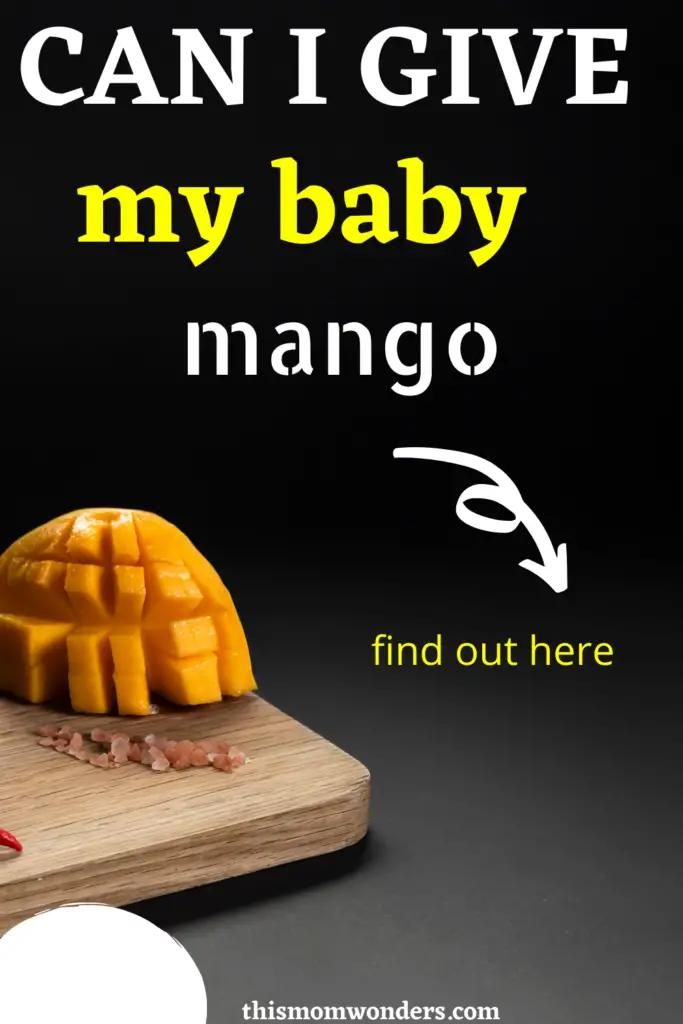Can Babies Eat Mango? Here’s Everything You Need To Know

Mango is a wonder fruit – it’s sweet and juicy and yet so fleshy and filling. I’m yet to meet a person who hates mangoes. As with everything nutritious, we would want our babies to enjoy the benefits of mango; however, can babies eat mango?
From the moment babies are weaned, mothers agonize over what is healthy and allowed. I remember having a crisis meeting with my partner over whether our 7-month-old baby should have yogurt or not. As we kept introducing foods, we faced a similar dilemma with various foods. Today’s dilemma is mango.

What are the benefits of mango for your baby?
Mango is the one fruit we would give to babies just because it’s yummy.
Given most babies’ fussiness and reluctance to new tastes, any mother would be forgiven for wanting to introduce something delicious to their babies. Fortunately, with mango, it’s not just all yumminess and no nutrition.
Mango helps improve immunity
Mangoes are laden with vitamin C, carotene and beta-carotene. These three are vital in improving your baby’s immune system.
As your baby is rapidly developing, their immune system needs to be strong enough to ward off infections.
It helps add baby’s weight
Which mother does not agonize over her baby’s weight? I felt very accomplished every time we went for antenatal clinics, and the baby had added significant pounds.
Loaded with good easily absorbed calories, mango is one fruit that will help the baby tip the scales on your next ante-natal check-up.
Improved vision and skin
Vitamin A and carotene present in mangoes help with improved vision for your child. As long as your baby has a good supply of vitamin A, you’ll not have to worry about dry eyes, itchy eyes or cornea problems.
Besides, you’ll be bringing up one little champ with great vision.
Vitamin A comes with multiple blessings. It’s also an excellent ingredient for great acne-free skin and a sunblock.
The mango is both good for eating and also as a skin moisturizer. Apply some mango puree on the baby’s skin 10 minutes before bath time to keep his skin soft and supple.
Better digestion and bowel movements
One of the problems of introducing new foods to a stomach that has been feeding on liquids for months is the possibility of constipation.
Most moms blend or sieve the food making it too smooth, which increases the chances of the baby having painful bowel movements.
Mango has fiber which aids digestion and helps curb constipation.

How to give your baby mango
With the question ‘can your baby eat mango?’ now answered; next, we’d like to explore ways in which you can feed your baby some mango delicacy.
The mangoes you choose should be well ripe and not have too much fiber. Apple mangoes are ideal for babies.
Do not give an unripe or half-ripe mango to a baby. The sap from unripe mangoes can cause mouth ulcers.
Make a mango puree
Can babies eat mango puree? Absolutely. If your baby’s teeth haven’t developed yet and he cannot nipple or chew on the mango at all, I’d recommend making a mango puree.
The puree is easier on the baby’s tummy than larger mango chunks.
To make a mango puree, choose a mango that is well ripe and soft. Wash it with water and then soak them for a couple of minutes in a vinegar solution to kill bacteria and remove any harsh chemical.
Rinse it once more, then chop the peeled mango into a blender and blend to a thick pulp. Add water to attain the consistency you prefer.
Little mango cubes strips
Babies who can chew can have little pieces of mango chopped up and put on a plate. Do not make the chunks too big to prevent chocking. NEVER LEAVE THE BABY UNATTENDED WHEN FEEDING.
The mango seed with some little mango left on it can form an excellent teething pad.
Mango mélange
Mango puree can be mixed with another fruit or food to give it a different taste and flavor. Do not mix the mango with any food that the baby has not eaten before. You can mix mango with apple puree or butter squash.

Frozen Large Mango Chunks
Mangoes can help your baby cool teething gums. Simply chop huge mango chunks and freeze them. Once they are frozen, give them to your baby to help relieve their teething gums as well as eat them
Possible mango allergies
As much as we love them, one can have allergic reactions to mangoes. Fortunately, though, allergic reactions from mango are mostly as a result of the sap from the mango tip.
The likely sign would be an ulcer on the mouth if the baby put the uncut mango in his mouth.
Trend carefully if anyone in the family has had an allergic reaction to mangoes.
Only give small portions at a time and wait for at least 24 hours before feeding the baby the mango puree again.
Conclusion
Can babies eat mango? The good news is, yes, babies can eat mango. From 8 months, mango should be part of your baby’s diets due to its numerous nutritional benefits.
I have to admit I was always anxious about weaning my children. The first six months are bliss. Before they are weaned, I’m all they need for food and transport.
Breastfeeding always feels a lot easier for me. Enter weaning, and I now have to carry containers of foods and drinks if I have to go anywhere.
Constipation that followed in some instances drove me crazy as I watched my baby hurting. I was always super cautious about introducing a new food as I didn’t know how it would react with the baby.
Reading about the various foods helped me know what to exp ect. But children react differently to different foods.
Some foods are also age-specific; it’s good to know when to introduce them to avoid exposing your baby to infections or reactions.Mango included. Do not give mango to children 6 months or younger.
PIN THIS FOR LATER
